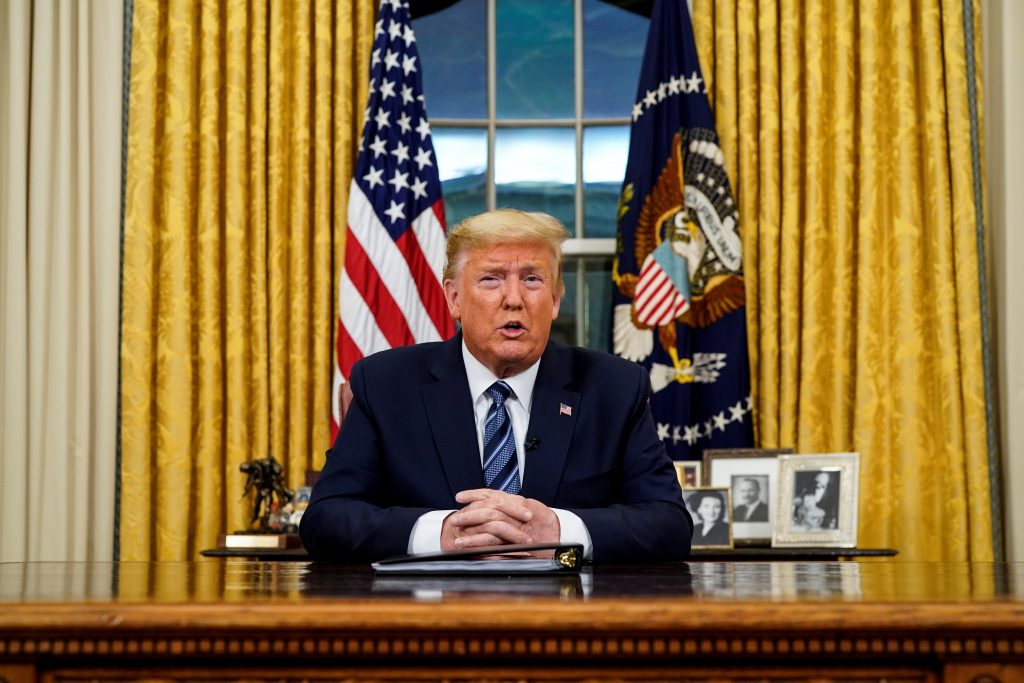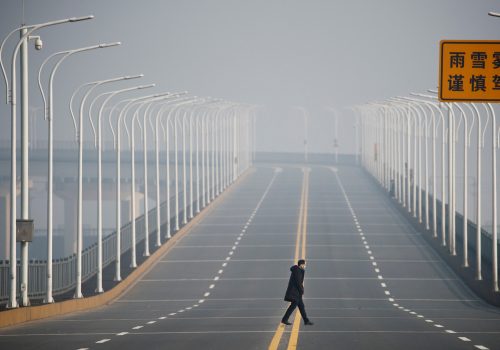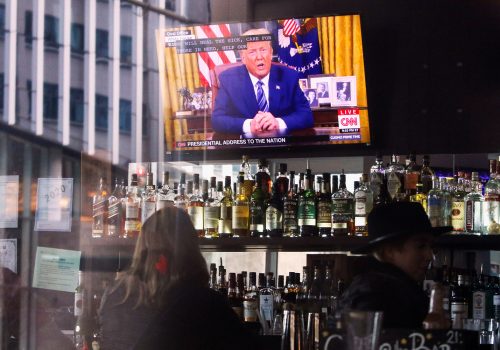While listening to President Trump announce the European travel ban in his Oval Office address, my mind wandered back in time to the early G20 meetings of finance ministers and heads of government in 2009 when the United States and its European partners worked together to head off a global financial meltdown.
I then travelled back a little further in time to the terrorist attacks of 9/11, a day on which I found myself traveling on the Eurostar between London and Brussels, my two homes at the time. For the first time in NATO’s history, our European and Canadian allies triggered the alliance’s Article 5 commitment to common defense.
Going back to read the language of this provision, written in 1949 to deter Soviet aggression, it struck me that Trump could have produced a far more presidential moment this week if he had done what the Europeans did for the United States back then. He should offer the transatlantic community an Article 5 declaration of war against this deadly pathogen.
Get the Inflection Points newsletter
Subscribe to Frederick Kempe’s weekly Inflection Points column, which focuses on the global challenges facing the United States and how to best address them.
If NATO could bend Article 5 to combat a non-state terrorist actor striking the United States, why not also to combat the Chinese-originated COVID-19, which by Friday had infected more than 28,000 individuals and killed more than 1,200 among NATO allies. Given current transatlantic divisions, there is far greater need now than after 9/11 for a symbolic gesture of unity.
President Trump could have confounded his critics, calmed markets and perhaps even outlined common cause efforts – including travel limitations – that he and his administration had agreed to during consultations with our NATO partners and the European Union. “Article 5 provides that an attack on one of us is an attack on all,” he could have said, Three Muskateer-like. “It’s all for one, and one for all!”
There’s also a strong America First reason why President Trump should have leaned more in that direction. He’s going to need Europe, just as the United States did in 2009, as this health crisis is quickly becoming a markets and financial crisis that could be addressed far more effectively through coordinated public health and fiscal stimulus measures.
Though no one wishes the world a financial crisis of the 2008 and 2009 dimensions, it would be irresponsible not to begin talks among the world’s major economies and democracies about what strains they see in the system and what contingency planning they should be undertaking should the coronavirus slowdown continue. Compared to 2009, the world’s record debt levels and its low to negative interest rates provide far less capability and then demand even more common cause.
Instead, what unfolded on 3/11/2020 in Europe and the United States were events that further underscored how divided the United States and its European partners are when they should be most united. Without consulting our allies at all, he implemented the ban – which took effect on Friday at midnight in an Oval Office address on all American television networks that left his own national security team scratching its heads, correcting mistakes (cargo wouldn’t be banned, as the President initially said), and filling in critical omissions (Americans could still travel home from Europe).
The result was one of the harshest responses ever recorded from EU leaders to an American President. A joint statement by President of the European Commission, Ursula von der Leyen, and President of the European Council, Charles Michel, read: “The Coronavirus is a global crisis, not limited to any continent and it requires cooperation rather than unilateral action. The European Union disapproves of the fact that the U.S. decision to impose a travel ban was taken unilaterally and without consultation. The European Union is taking strong action to limit the spread of the virus.”
“When it comes to solidarity and unity, the United States is failing the coronavirus test,” Benjamin Haddad, the director of the Atlantic Council’s Future Europe Initiative, wrote in the Washington Post. “President Trump’s speech Wednesday on the response to COVID-19 marked one of the most consequential foreign policy turning points of his presidency. This moment represents the lowest point in transatlantic relations in recent memory.”
Sadly, the recent days have also shown how divided Europeans are among themselves, with Italians complaining that their call for help has brought insufficient assistance to the country so far hardest hit in Europe by the virus. At previous such times of European uncertainty, the United States could provide necessary glue to keep everyone together.
“….it’s time now for the EU to go beyond engagement and consultations,” Maurizio Mazzari, the Italian permanent representative to the European Union, wrote in Politico, “with emergency actions that are quick, concrete and effective.”
He complained that “not a single EU country” had responded to the call to activate the European Union Mechanism of Civil Protection for the supply of medical equipment for individual protection. “Only China responded bilaterally. Certainly, this is not a good sign of European solidarity.”
Unimaginably, Italian newspapers were full of Beijing’s outreach to help on the very same day that President Trump declared his European travel ban.
A plane carrying a team of specialist doctors with battleground experience fighting the virus left China on Wednesday for Italy, the European epicenter of the pandemic, with urgently needed medical equipment. That includes 2 million facemasks, 20,0000 protective suits and 10,000 ventilators.
The gesture was widely publicized in China and Italy. A report in China Daily said that thanks to donations from people living in the East China’s Zhejiang province, some 4,556 boxes of disaster-relief materials were on their way to Italy. More than 300,000 people from the province live and work in Italy.
Crises either make institutions and relationships stronger or weaker, but they don’t leave them unchanged. A pandemic’s political danger is that countries – just like some individuals – feel that it’s everyone for themselves.
Yet after an unforgivable initial delay, Europeans are beginning to show more solidarity among themselves. EU leaders have committed 25 billion euros to respond to the economic fallout, of which $7.5 billion euros should be available quickly to provide emergency necessities.
Now it’s the United States’ turn to mend the message of this week. As fanciful as this idea might sound, it’s time to invoke NATO’s Article 5 to tackle the virus. It may take that dramatic of a symbolic action to repair the transatlantic damage that has been done.
This article originally appeared on CNBC.com
Frederick Kempe is president and chief executive officer of the Atlantic Council. You can follow him on Twitter @FredKempe.
MUST-READS FROM A WORLD IN TRANSITION
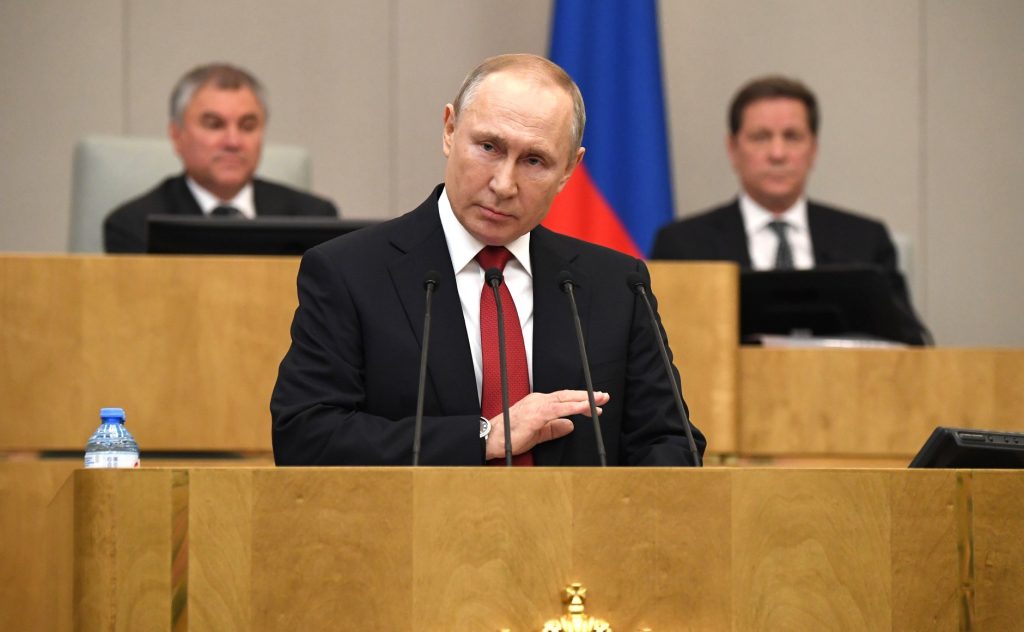
In a week that ended with President Trump declaring a national emergency, the week’s top reads inevitably focus on coronavirus – an Inflection Point of the sort none of us has experienced in our lifetimes, with economic, political and social implications this space will continue to track in coming days and weeks.
With so much being written on so many aspects of this global pandemic, the below is merely a small sampling of what I found worth reading.
#1. THE URGENT CASE FOR MITIGATION
Without Mitigation, Toll in U.S. May be Staggering, Experts Say
Sheri Fink / NEW YORK TIMES
The Virus and Leadership
The Editorial Board / WALL STREET JOURNAL
A front-page piece today in the New York Times reports on
the shocking results of modeling by officials of the U.S. Centers for Disease
Control and Prevention, and epidemic experts from around the world on what
might happen if coronavirus gains foothold in the United States.
If you have any doubts regarding the value of “social distancing,” read every
word of this one. For without mitigation, or “non-pharmaceutical
interventions,” one projection in the CDC’s scenarios estimates that between
160 and 214 million people in the United States could be infected, and between
2.4 to 21 million people could require hospitalization. Read More →
The Wall Street Journal’s editorial board delivered one of the most quoted
lines of the week: “Trump’s main opponent isn’t Joe Biden. It’s the
coronavirus.” Writes the newspaper: “Mr. Trump is right that his opponents, in
politics and the media, want to turn the virus into his Hurricane Katrina. That
is inevitable and he shouldn’t take their bait… The best reply is cool and
realistic leadership that marshals the strengths of the government the
President leads. This means letting the experts speak … and (not) speculating
about things he doesn’t know much about.” Read More →
#2. THE EUROPEAN EPICENTER
Experts expect a surge like Italy’s across Europe
Loveday Morris and William Booth / WASHINGTON POST
Italy’s Health Care System Groans Under Coronavirus – a Warning to the World
Jason Horowitz / NEW YORK TIMES
President Trump was right on one matter this week, and that is that the epicenter for the virus’ current global spread is Europe. More reason to combine forces to address it.
Washington Post reporters Loveday Morris and William Booth predict from experts that much of Europe in coming weeks could experience the sort of surge that Italy is already weathering. The experts see a sharp trajectory of infections in Germany, France, Britain and Spain, which declared a state of emergency Friday. Read More →
The New York Times’ Jason Horowitz reports richly on the three-week surge of the virus that has overloaded northern Italian hospitals, “offering a glimpse of what countries face if they cannot slow the contagion.” Read More →
#3. THE SOUTH KOREAN MODEL
South Korea is Beating the Coronavirus. Mass Testing is Key. But There’s More.
Donald Kirk / THE DAILY BEAST
The teaser for Donald Kirk’s story on South Korea tells it all: “From drive-thru testing to phone alerts, Seoul has developed ways to counter the disease without crushing democracy, and the number of infections is declining.”
Kirk delivers the point right up top: “Americans would do well to look to South Korea for an example of how to contain and possibly defeat the fast-spreading coronavirus.”
The most interesting innovation, which President Trump mentioned this week, were “drive-by centers to test those with symptoms without asking them to leave their vehicles.” The results are known a few hours later.
The proof is in the numbers – showing the virus under control in South Korea, where the worst seems to be over. Read More →
#4. MEANWHILE, IN RUSSIA
Vladimir Putin Positions Himself to Become Russia’s Eternal Leader
Joshua Yaffa / THE NEW YORKER
With the world’s attention on its health and related financial difficulties, President Putin set himself up through new legislation to remain president until 2036, when he turns 83. As is the case with Chinese leader Xi Jinping, the trend toward “president for life” is clear in both countries.
Writes Joshua Yaffa, Moscow correspondent for The New Yorker: “Having denuded all other bases of authority and centered all power in his own personality and image, Putin has no way out. In a self-fulfilling prophecy, Putin convinced himself that the only way to restore and burnish Russian power was through first assembling and then maintaining unitary power for himself. Now any move to disassemble the latter is seen as a risk to the former.” Read More →
#5. “A FAILURE OF IMAGINATION”
‘Don’t Panic” is a Rotten Response
Peggy Noonan / WALL STREET JOURNAL
This week’s column is Peggy Noonan at her best – writing with a sense of outrage and with a good amount of common-sense advice on how to take on a challenge we had never imagined happening. It included taking the hand-washing advice to a new level of “wash your hands like Lady Macbeth with obsessive-compulsive behavior.”
With experts telling us that 70 to 150 million Americans will be infected and with Harvard epidemiologist Marc Lipsitch estimating 20% to 60% of people in the world might catch the disease, she writes, “Sometimes paranoia is just good sense. Is all this an overreaction? If it is, we’ll recover.”
She suggests we purge two popular phrases at the moment – “don’t panic” and “out of an abundance of caution.” Writes Noonan, “… in a world-wide crisis, the cautions we must take aren’t abundant, they’re reasonable and realistic.” Read More →
QUOTE OF THE WEEK
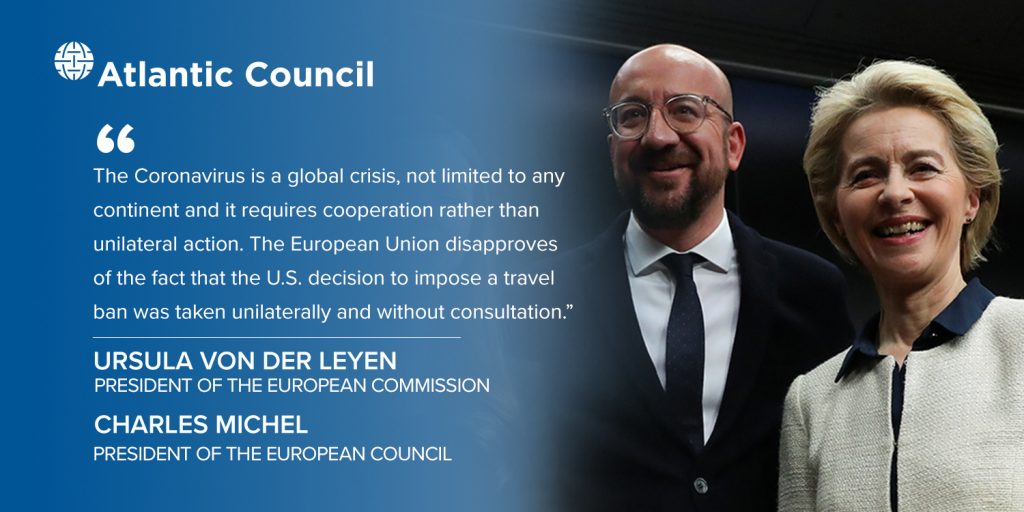
ATLANTIC COUNCIL TOP READS
Image: U.S. President Donald Trump speaks about the U.S response to the COVID-19 coronavirus pandemic during an address to the nation from the Oval Office of the White House in Washington, U.S., March 11, 2020. Doug Mills/Pool via REUTERS
